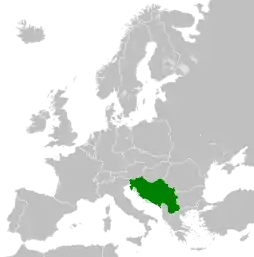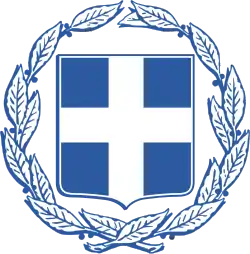Greece–Yugoslavia relations
Greece–Yugoslavia relations were historical foreign relations between Greece (Second Hellenic Republic, Kingdom of Greece and contemporary Third Republic) and now split-up Yugoslavia (both Kingdom of Yugoslavia or Socialist Federal Republic of Yugoslavia). Relations between Greece and independent South Slavic states (primarily Serbia) developed before creation of Yugoslavia and played prominent role during the Balkan Wars. Creation of Yugoslavia was agreed and made possible after the signing of the Corfu Declaration agreed at the Municipal Theatre of Corfu.
Greece |
Yugoslavia |
|---|---|
Greece |
Yugoslavia |
|---|---|
Greece |
Yugoslavia |
|---|---|
.svg.png.webp)

Relations between the two states were generally friendly and were only occasionally affected (priarily in the aftermath of the World War II) by Yugoslav involvement in the Greek Civil War on EAM's side or concerns of the Socialist Republic of Macedonia which raised in prominence only after the independence of the North Macedonia. Following the 1948 Tito–Stalin split Greece supported Yugoslav strategic position via creation of the Balkan Pact. In addition to Greece, Non-Aligned Yugoslavia developed close relations with another predominantly Greek country, Non-Aligned island nation of Cyprus.
History
Interwar period
After the end of World War I Greece perceived Belgrade as a powerful neighbor with potentially hegemonic tendencies in the Balkans.[1] Yugoslav ability to attract support from the great powers, mainly France, created concerns in Athens that Yugoslavia will pressure Greece on the status of Slavic speakers of Greek Macedonia and potentially even the Port of Thessaloniki.[1] Greece was concerned that close ethnic, linguistic and religious links between Yugoslavia and Bulgaria will lead to an alliance. This alliance however did not materialize as Yugoslavia was a status quo state which sought to consolidate success of the South Slavic unification movement while Bulgaria was revisionist state.[2] Similarly to the situation with Kingdom of Serbia in the Second Balkan War, Yugoslavia joined forces with Kingdom of Greece, Kingdom of Romania and Turkey in establishing the Balkan Pact aimed at maintaining the geopolitical status quo. Compared to emotional tensity which Macedonian question enjoyed among Bulgarian elites, dominant Serb (and to a lesser extent Croat and Slovene) elites in the Kingdom of Yugoslavia expressed lesser interest in the issue. Kingdom of Serbia reoriented its expansionist interest towards south (regions with small number of ethnic Serbs) only after the Bosnian Crisis and in fear of encirclement between more powerful Austria-Hungary and Bulgaria. In Yugoslav period southern part of the country was known as the Vardar Banovina.
Initial postwar years
In May 1945, 4,650 Greek refugees, mostly male members of ELAS, settled in the village of Maglić with the help of Yugoslav government. From 1945 to 1948, it was a sui generis case of Greek extraterritorial jurisdiction.[3] The Yugoslav conflict with the Informbiro saw the Greek community divided between loyalty to Yugoslavia and to the Comintern, and those who supported the latter left the country. The remaining also emigrated to Greek Macedonia eventually, with only a few remaining.
Post-1948 relations
Yugoslav Non-Aligned policy enjoyed significant public support in Greece, especially among individuals and groups critical of too close Greek alignment with west which limited its policies towards Turkey, another NATO member state.[4] Relations between the two countries developed further after the end of the Greek junta in 1974 and electoral victory of PASOK in 1981.
See also
- Yugoslavia–European Communities relations
- Reaction in Greece to the Yugoslav Wars
- Greek–Yugoslav confederation
- Croatia–Greece relations
- Greece–Montenegro relations
- Greece–North Macedonia relations
- Greece–Serbia relations
- Refugees of the Greek Civil War
- Greece at the 1984 Winter Olympics
- Greece in the Eurovision Song Contest 1990
References
- Hatzivassiliou, Evanthis (2004). "From Adversity to Alliance: Greece, Yugoslavia and Balkan Strategy, 1944-1959". Balkan studies. 45 (1–2): 123–133. Retrieved 2 February 2021.
- Sheperd, David (1968). Relations between Yugoslavia and Bulgaria, 1918-1941 (Master Thesis). Durham University. Retrieved 2 February 2021.
- Nemanja Mitrović (3 August 2020). "Tito, Jugoslavija i Grčka: Buljkes, „država u državi" kod Novog Sada". BBC. Retrieved 2 February 2021.
- Ruža Fotiadis (21 May 2018). "„Opasni prijatelji, nevjerna braća" – bliskost i udaljenost u međunarodnim odnosima na primjeru Grčke i Jugoslavije". Retrieved 2 February 2021.

